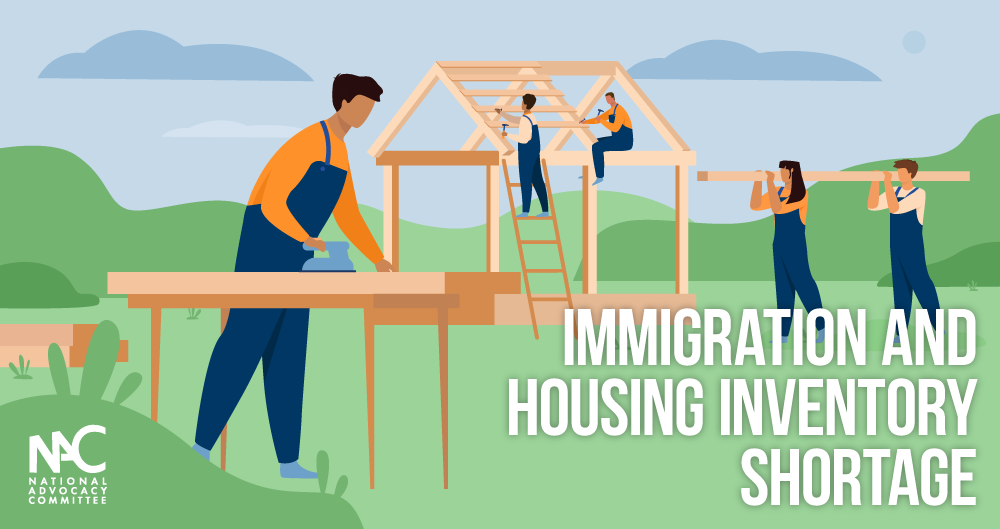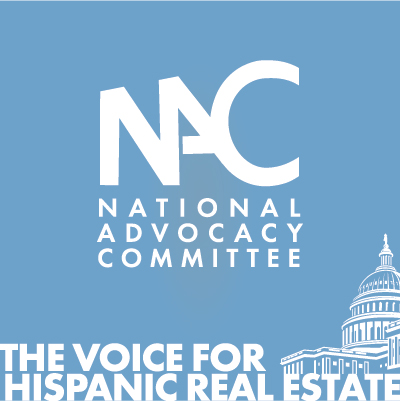NAHREP elevator pitch and immigration
Celebrating NAHREP familia, cultura, politics, and grassroots action
December 2, 2021
Qué onda mi gente?!
Recently, some of our NAHREP leaders were asked: “How would you describe NAHREP to elected officials?” I think the most important thing to remember in answering that question, is that when you describe NAHREP to elected officials or to any community leader in general, it is important to establish what we are, what we stand for, and why we matter in 30 seconds.
Here is the elevator pitch I use every time I describe NAHREP:
The National Association of Hispanic Real Estate Professionals (or NAHREP) is the largest Latino business organization in the country with a mission to advance sustainable Hispanic homeownership. With a network of over 40,000 professionals and 100 chapters, our organization wholeheartedly believes that homeownership is the number one strategy toward closing the wealth gap. Our advocacy revolves around 3 main issue areas: increasing the supply of housing, enhancing access to affordable mortgages, and immigration reform.
I challenge you all to memorize that! It is exactly 30 seconds. That’s it. This elevator pitch describes who we are, what we do, what we care about, and why they should listen to us (we’re a large organization that’s all over the country!). If we all sing to the same tune, we will effectively brand our organization.

UPDATES ON IMMIGRATION
One thing we don’t talk enough about is immigration, a critical component of our policy agenda. Therefore, I thought I would give you all a quick update on what’s happening around immigration and some things we’ve been working on.
Comment Letter on DACA
This week, NAHREP submitted a comment letter to the Department of Homeland Security (DHS) addressing a recent proposed rule, Preserving and Fortifying Deferred Action for Childhood Arrivals (DACA). The rule was in response to the legal threats the DACA program has faced over the past few years. In an effort to protect DACA, the rule gives better guidance, offers a clearer definition of “deferred action,” outlines eligibility standards, and clarifies the role of employment authorization in the deferred action application process.
While this proposed rule is a good first step towards securing the program, we all know that there is still so much more that needs to be done, starting with passing the DREAM Act through Congress once and for all. In our comment letter to DHS, we proposed the following recommendations to improve DACA going forward:
- Make sure every DACA recipient has easy access to a work permit: Normally, DACA recipients can apply for a work permit as they apply for DACA. This new rule, however, would separate the work permit process from the DACA application. Our fear is that the change might make getting a work permit more difficult by confusing applicants or by increasing application processing times. This is why we asked that the application process not separate the two so individuals can get a work permit as they apply for DACA.
- Improve the DACA application process: We also advocated to update DACA’s eligibility requirements and program procedures. This includes reducing the backlog of DACA applications, lowering DACA application fees, extending work permit expiration dates, changing eligibility dates, and removing the age limit to include others who might qualify for DACA. In fact, the Migration Policy Institute estimates there are currently about 1.2 million eligible DACA recipients–imagínate! These changes would allow even more individuals to participate in DACA, have a work permit, and facilitate their ability to keep contributing to our country’s economic growth.
- Frame the rule by recognizing the significant contributions of DACA recipients through the COVID-19 pandemic: This rule is being written on the heels of DACA recipients being instrumental to keeping our country running during the pandemic. The final rule should be reflective of the fact that these individuals are critical to our economic prosperity. Approximately 76,600 DACA recipients worked in food services, 43,500 worked in the health care industries, and 21,100 were employed in transportation and warehouse services. DACA recipients were essential during the height of the pandemic and they remain essential to our country’s future.
Immigration and Build Back Better
We’ve written a lot about the reconciliation bill and the inclusion of immigration in the bill’s package. You might remember that the Parliamentarian ruled that the immigration bill was not allowed to be included in the reconciliation bill. In the bill that passed in the House a few weeks ago, however, there were some provisions to halt deportations and efforts to clear up immigration backlogs. As the Senate is in the thick of “doing their thing,” we already knew immigration could be on the chopping block.
No news is good news: Folks pushing for immigration got a good sign from the Parliamentarian last week: the Parliamentarian did not accept, reject, or recommend changes to the immigration provisions that would allow millions of undocumented immigrants to apply for work permits, permission to travel, and to receive temporary protection from deportation. This is a good sign mi gente!
Why This Matters
Bringing it all back to economics, there are more than 10 million job openings in the country right now with a severe labor shortage in the construction field. Homebuilders report that a labor shortage in construction is driving up the cost of building homes and contributing to our low housing supply. This is why it’s important to keep reminding elected officials about the economic case for immigration reform (after you’ve told them the elevator pitch.)
Finally, happy December, corazones! I put my tree up this weekend by the way, have you? Seriously, why can’t we just have a Christmas tree up all year long? My house looks so much better with a tree. One month is not enough. A poco no?

About Noerena Limón
Noerena Limón is NAHREP’s Executive Vice President of Public Policy and Industry Relations. Noerena heads the organization’s policy and advocacy efforts on issues ranging from homeownership, housing inventory, credit access and immigration.
Prior to joining NAHREP, Noerena spent six years at the Consumer Financial Protection Bureau (CFPB) and served as a political appointee under President Obama in the White House Office of Political Affairs.



